The younger generation of institutional investors isn’t holding anything sacred and is focused on understanding the fundamentals of investing and the value of human capital.
At the 2022 Milken Institute Global Conference on Wednesday, in a panel entitled “Institutional Investors: Long-Term Strategic Thinkers,” Rukaiyah Adams, the chief investment officer of Meyer Memorial Trust, said younger generations, including “Xennials,” a mashup of millennials and Generation X , are reimagining finance. Adams, who joined the trust in 2014, said her investment thesis is to throw out — or at least reevaluate — the old ways of thinking about assets, including legendary Yale CIO David Swensen’s model.
In the Yale model, Swensen emphasized stocks, with a minimal allocation to bonds and large commitments to venture capital, private equity, hedge funds, and international investments. Over the years, the model has become a blueprint — even if often criticized — for investment approaches at endowments and foundations across the country.
At the Meyer Memorial Trust, Adams said that she has placed an outsized emphasis on questioning everything. Instead of making assumptions about how asset classes work and how financial models function, Adams said the next generation of investors is focused on understanding the fundamentals of investments and theory. “If I don’t understand the math, then I’ll be working for the girl that does,” Adams said. “This generation of investors is starting to double click or question some of the [assumptions about assets].”
Adams described her style of leadership at the trust as “adaptive,” an approach to decision-making that allows her to “bend, not break.” She said her approach is largely a reaction to the mindset of newer generations of investors.
Raphael Arnd, the chief executive officer at Future Fund, who was also on the panel, attributed investors’ approach to the current economic environment partially to a generational shift in the wider population. “The whole world is changing, and those [changes] are flowing through to how economies work,” Arnd said.
Adams said that from her vantage point as a younger investor, the Covid-19 pandemic shifted the nature of the value of human capital — in other words, talent. With higher turnover rates and new employee demands spurred by the pandemic, an increased emphasis on retaining and investing in talent for the long-term has arisen, Adams said.
Arnd agreed and said that as long-term investors, institutions cannot afford the costs of high turnover rates.
Adams’ generational outlook also extended to her comments about environmental, social, and governance strategies. In the engagement versus divestment debate, Adams is all for engagement. She said she sees ESG as less about restricting or prohibiting “bad actors” from occupying a space in the trust’s portfolio and more about engaging with companies to improve their practices.
“We can carve out impact investing as this wee, cute thing for millennials and below…but in fact, all investing is impact investing,” Adams said.







